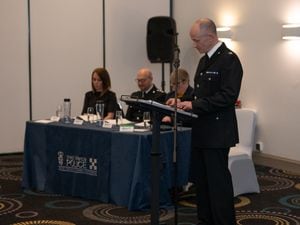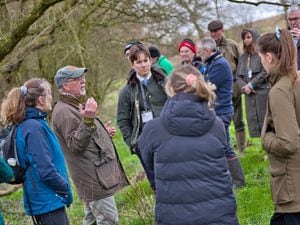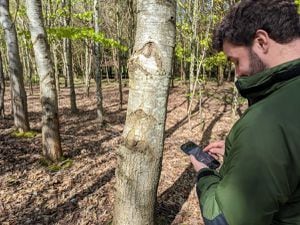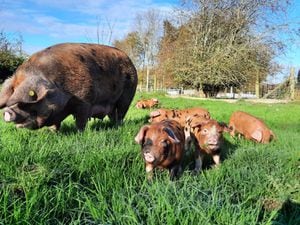Plans to restore the home of playwright John Osborne
It's one of Shropshire's best kept secrets. If you were to survey a random selection of 100 Shropshire residents, probably no more than one of them would be able to talk authoritatively about The Hurst, in Clunton. And yet it's one of the county's most important buildings.
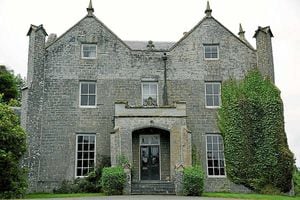
So let's bring you up to speed. The Hurst, a stunning gentleman's residence comprising a cluster of stone-built homes and outbuildings, sits in rolling countryside in south Shropshire.
It was formerly the home of Shropshire's greatest playwright, John Osborne, the iconic Fifties author responsible for Look Back In Anger, a play that transformed British theatre.
He died in 1994 in Clun and is buried there, along with his fifth wife, Helen Dawson. Their home was The Hurst and today it is managed by The Arvon Foundation, one of the UK's leading arts organisations, which hosts creative writing courses there.
It is as far removed from the clichéd 'luvvie' idea of arts as it's possible to be. Courses in Shropshire may be held for young offenders from Northern Ireland one week, while Poet Laureate Carol Ann Duffy may be tutoring seven days later.
Working with those in need is a key part of Arvon's mission. Youngsters with long criminal records are frequently introduced to the therapeutic benefits of literature, often with incredible results.
The Hurst retains a low-profile, however, though that may soon change with the launch of a £3.3 million scheme to restore its crumbling buildings.
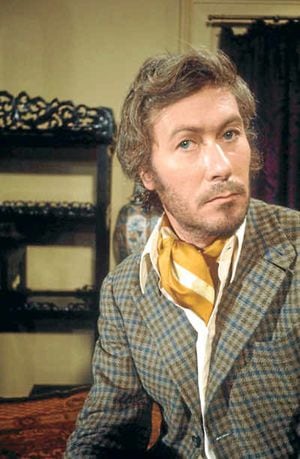
Although Arvon has been successfully running writing courses at The Hurst since 2004, it is only using a small amount of the 26-acre site. The beautiful Manor House is partially disused, and many of the outbuildings have fallen into disrepair. The rooms where John and Helen Osborne lived, including his study, have been empty for almost a decade.
Over the next few years, Arvon will bring the whole site into use. The Manor House will be renovated to contain all the facilities needed for courses, from study bedrooms with beautiful views of the Shropshire countryside to workshop spaces. That will allow Arvon to increase its work with under-18s and disadvantaged adults, ensuring The Hurst is open to those who need it most.
When the renovation of the site is complete, it will also be able to host established and emerging writers for longer periods. They will work on substantial projects in the inspirational surroundings. When The Hurst reopens, it will offer opportunities to nearly 1,000 young, aspiring and established writers every year.
The Arts Council recognises the value of the work and has donated £1.8 million. Further donations have taken The Hurst to more than 90 per cent of the way towards the £2.25 million needed for Phase 1. However, Arvon urgently needs support to reach its fundraising goal and save the Manor House.
George Palmer, from Arvon, said: "The first priority is to rescue the Manor House.
"The newly developed building will offer large spaces for workshops and tutorials in the main reception rooms and new cooking and dining spaces in John Osborne's own kitchen.
"There will also be single, en suite study bedrooms for all guests."
It is hoped work will start in spring, with a further phase to follow. Mr Palmer added: "In Phase 2 we will transform the Clockhouse into a writers' retreat, allowing us to welcome established and emerging writers from around the world to The Hurst for longer periods of two weeks to two months.
"We will also develop the 26 acre grounds – currently overgrown and inaccessible in many areas – and provide 'writers' hides' across the landscape."
Despite its semi-derelict condition, The Hurst is an important part of the landscape for British literature. Many of the rooms in the Manor House, including John Osborne's atmospheric study and the farmhouse kitchen, which was the scene of his last play, Déjà Vu, have great historic importance.
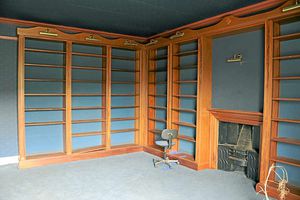
Mr Palmer added: "Arvon has never had the resources to convert the Manor House for our use, and we work primarily in the converted stable block, the Clockhouse.
"Dereliction happens so quickly once a house is unlived in, even with responsible care-taking, and John Osborne's great home is now on the cusp of shifting from a great and literary backdrop to a considerable liability.
"By renovating the building and using this space more effectively, we will create ideal facilities for our work with schools and youth and community groups.
"Many of those we work with are from the most disadvantaged communities in the UK and we know that Arvon's impact on these groups is particularly profound. We will be able to double our work with these groups at The Hurst. We will also move our writing courses into the Manor House, so that all of Arvon's writers will benefit from the improved facilities."
When the scheme comes to fruition, The Hurst will once more be used to create great literary works – just as it was in Osborne's day. That is a legacy of which he would have been proud.
Further details are available by emailing development@arvonfoundation.org or telephoning 0207 324 2554.

